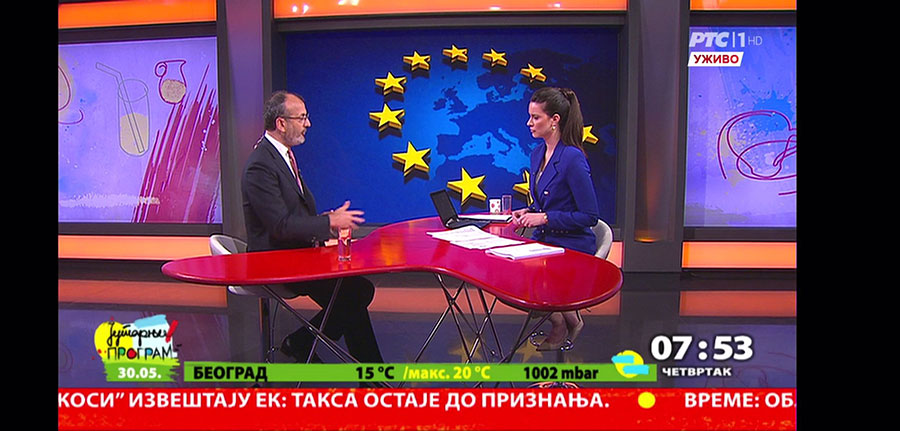The Head of the Delegation of the European Union to Serbia, Ambassador Sem Fabrizi, was a guest in the RTS Morning Show, where he talked about the key conclusions from the Annual Report on Serbia, presented yesterday in Brussels.
The Ambassador recommended that all institutions take a look at the Report, see what the recommendations of the European Commission are, especially when it comes to the recommendations that are given for further progress in order to achieve better results.
The European Commission has positively assessed Serbia’s economic reforms. However, the Head of the EU Delegation to Serbia adds that there is a whole series of reforms that Serbia must continue to work on in order to make progress. He particularly emphasized the rule of law where, as he says that there is not enough progress and where more needs to be done.
“The Commission also discussed the regional cooperation, relations with neighbors, with, of course, the emphasis on the need to continue dialogue to normalize relations,” Fabrizi said.
He also commented on the reaction of Prime Minister Ana Brnabic about the Report.
“Yesterday the Prime Minister made comments that were mostly positive. She also expressed completely legitimate views on some parts of the report, but also the comment she made is that Serbia will remain committed to European integration, will consider the recommendations in the report and will accordingly react, “he said.
He added that the message for Serbia is that it must move forward, be faster, more dedicated and more focused. Ambassador Fabrizi says that, regarding the relations between Belgrade and Pristina, the situation is still difficult. As for 2025, when Serbia is expected to join the EU, he explains that, by definition, the accession process can`t have a deadline.
“You can`t expect that all criteria will be fulfilled until a certain moment, 2025. That is the indicative date set by the Commission in order to implement certain reforms. Also, a few years ago, the Commission said that, if the situation is so it does, but it does not have to mean it will be,” the ambassador said.
In addition to Serbia, the European Commission’s report was issued for other negotiating countries in the region. Fabrizi says that the commission’s assessment is based on its own merits and that each partner has his own way.
“What is important for this package is that the Commission has proposed opening negotiations with Albania and North Macedonia. In that sense, the European Commission has remained very dedicated, pushing the enlargement process to the Western Balkans,” the ambassador concludes.
Read more:
Key conclusions from the Annual Report on Serbia
Text of the report in English
Reforms in the Western Balkans and Turkey: Annual assessments and recommendations




